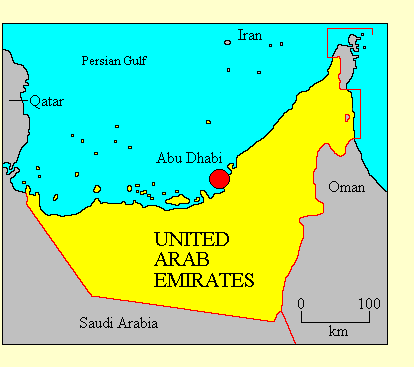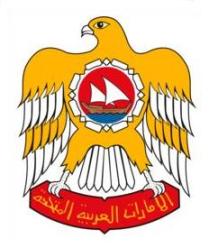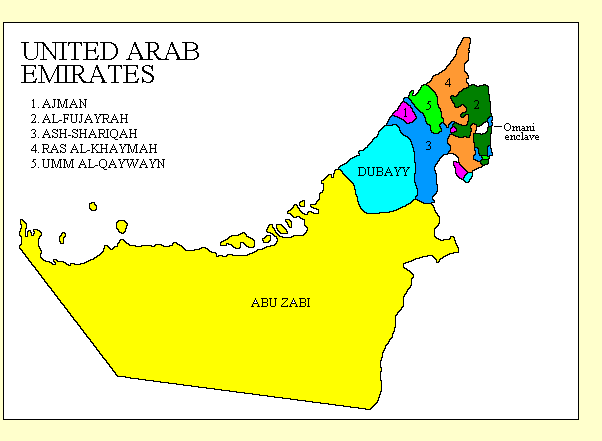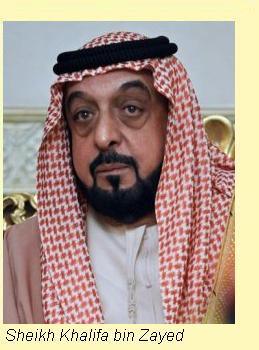

UNITED ARAB EMIRATES
• Official name: Al-Imarat al-Arabiyah al-Muttahidah (United Arab Emirates)
• Location: West Asia
• International organisations: Arab League, Non-Aligned Movement, Organisation of Islamic Conference,
United Nations, World Trade Organisation.
• Borders: Oman, Saudi Arabia
• Coastline: Persian Gulf
• Land area: 82,880 Km2
• Population: 6,900,000
• Annual GDP (PPP) per capita: US$42,000 (2009 CIA estimate). World ranking: 11
• Ethnicity: Only 20% of the population are Emirate Arabs. Another 20% are Arabs from other countries, the
largest groups being Egyptians and Omanis. The rest of the population are immigrant workers from South
Asia (50%), Iran and other countries.
• Languages: Arabic is the official language and the language of all natives of the Emirates, but is the
first language of only 40% of the population. The most widely spoken languages in the immigrant communities are
Malayalam (13%), Baluchi (8%), Pashto (6%), Farsi (5%), Telugu (5%), Somali (4%) and Bengali (3%).
• Religion: Islam is the state religion and virtually all the Emirate Arabs are Sunni Moslems. A large
majority of the immigrant population are also Moslems, with Shi'a Moslems making up 15% of the total population.
There are small Christian and Hindi minorities.
• Form of government: Presidential federation. The United Arab Emirates is a federation of seven Emirates,
all heriditary absolute monarchies, but it has a republican form of federal government.
• Capital: Abu Dhabi
• Constitution: The
 Constitution of the United Arab
Emirates came into effect on 2 December 1971 and became permanent on 18 June 1996.
Constitution of the United Arab
Emirates came into effect on 2 December 1971 and became permanent on 18 June 1996.
• Head of state: The President, chosen by the Federal Supreme Council (consisting of the seven hereditary
Emirs and their heirs) for a five-year term. In practice the post is always held by the Emir of Abu Dhabi.
• Head of government: The Prime Minister, chosen by the Federal Supreme Council. The Prime
Minister is usually the Emir of Dubai or one of his sons.
• Legislature: The United Arab Emirates has a unicameral advisory legislature, the
Federal National Council (Majlis Watani Ittihad), which has
40 members, of whom 20 are elected by a 6,700 member electoral college, whose members are appointed by the governments of the
seven Emirates, and 20 are appointed by the Emirs.
• Electoral authority: None
• Freedom House 2009 rating: Political Rights 6, Civil Liberties 5
Political history
The group of independent Emirates which now constitute the UAE owed a nominal alliegance to the Ottoman
Sultan from the 16th century. The British entered the Gulf in the early 19th century to stop pirate raids on
India-bound shipping, and in 1853 the Gulf Emirs were compelled to sign a "perpetual truce" and treaty of
alliance with Britain. A second treaty in 1892 made the Trucial Emirates, along with Bahrein, Kuwait and
Qatar, effectively British protectorates. The discovery of oil in 1958 made the larger Emirates, Abu Dhabi and
Dubai, very rich and attracted many non-Arab guest-workers.

The British withdrew from the Gulf in 1971 and Bahrein and Qatar became independent. The seven smaller
Emirates (Abu Dhabi, Dubai, Sharjah, Ajman, Umm al-Qaiwain, Ras al-Khaimah and Fujairah) formed a loose
federation. The Emir of Abu Dhabi, Sheikh Zayyed bin Sultan Al Nahayyan, was elected President by the other
Emirs in 1971 and retained the position until his death in 2004, when his son
Sheikh Khalifa bin Zayed Al Nahyan
succeeded him. The other six emirates (which apart from Dubai are very small) retain control of their internal
affairs.
There are no political parties in the UAE and the legislature is nominated by the Emirs. The population
of the Emirates has grown dramatically over the past 20 years, leaving the Emirate Arabs a small minority.
The majority of the population who are not Emirate Arabs have no civil or political rights. In these circumstances
the Emirs cannot loosen their grip on power without the risk that the non-Arab population will gain power.
Freedom House's 2009 report on the United Arab Emirates
says: "The UAE is not an electoral democracy... There are no political parties in the country. Instead, the
allocation of positions in the government is largely determined by tribal loyalties and economic power...
The UAE is considered one of the least corrupt countries in the Middle East. It was ranked 35 out of 180
countries surveyed in Transparency International's 2008 Corruption Perceptions Index... Although the UAE's
constitution provides for some freedom of expression, the government has historically restricted this right
in practice... The government places limits on freedoms of assembly and association... The judiciary is not
independent, with court rulings subject to review by the political leadership."
Updated June 2010
|


